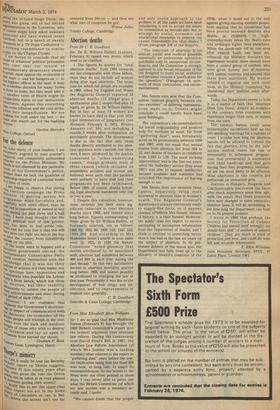From Miss Elizabeth Rhys-Williams
Sir: I am so glad that Mrs Madeleine Simms (February 9) has brought the 1939 Birkett committee's report into the present argument over abortion law reform. During the controversy over David Steel's Bill in 1967, the Abortion Law Reform Association (of which Mrs Simms was a leading member) often referred to the report as "gathering dust" since before the war, the implication being that the Steel Bill was now, at long last, to enact its recommendations. As our letters to the Press were not often printed in those days. I was never able to point out what the Birkett Committee (of which my late mother was a member) actually said. I quote: "We cannot doubt that the proper and only sound approach to the problem in all the cases we have been considering is not to accept the desire for termination as ineradicable, but to attempt by social, economic and educational measures to remove the causes responsible for that desire." (From paragraph 238 of the Report).
"The induction of abortion is on ethical, social and medical grounds essentially an undesirable operation, justifiable only in exceptional circumstances, and the Committee is strongly opposed to any broad,relaxation of the law designed to make social, economic and personal reasons a justification for the operation." (Paragraph 14, summary of main conclusions and recommendations).
Mrs Simms says now that the Committee "steered gingerly between the two extremes" of differing representations made to it. Others might conclude it could hardly have been more forthright.
The committee's recommendations for social responsibility and positive help for mothers in need, far from "gathering dust", were fortunately acted on by governments between 1939 and 1967, with the result that annual deaths from abortion fell from 354 to 35, and deaths of mothers in childbirth from 1,643 to 139. The most striking improvement was in the first ten years, when the midwifery service (free since 1937) was able to expand, antibiotics became available and ministers had conceded the importance of having enough to eat.
Mrs Simms does not mention these figures, apparently being more interested in abortion than in woman's health. The Registrar-General's department is always courteously ready to supply.fthe facts, so if anyone chooses toolottlieve Mrs Simms' version of history, it is their funeral. However, the public does not expect to receive misleading or incomplete information from the Department of Health, and I think is entitled to something better than it has had in the last six years on the subject of abortion. In its passionate defence of the status quo, the Department has fully lived up to the Ministry of Health's tradition of the 1930s, when it stood out to the end against giving starving mothers proper food, arguing that no connection had been proved between debility and deaths in childbirth. In highunemployment areas the death-rate was strikingly higher than elsewhere. When the death-rate fell in one area after vitamin foods had been distributed, the Ministry declared the experiment invalid: there should have been a control group of mothers who were given dummy jars of -marmite with useless contents, and assured that these were nutritiouS. My mother refused to organise any such cruel hoax, so the Ministry triumphed, but abandoned their position soon afterwards.
Today the Department seems to hold it as a matter of faith that 'Abortion Does You Good,' despite all evidence to the contrary from countries with experience longer than ours, or indeed from our own.
The tobacco barons (with some praiseworthy exceptions) held up the anti-smoking warnings for a number of years. I wonder how long the abortion barons will be allowed to conceal the fact that abortion, even by the 'safe' suction method, raises the risk of prematurity in subsequent pregnancies; that prematurity is associated with child handicap; and that girls having their first pregnancy terminated are the most likely to be affected. Most abortions in this country are performed on unmarried girls.
Doctors in Hungary. Bulgaria and Czechoslovakia discovered the facts after much experience some time ago, with the result that these countries have now changed to more restrictive abortion laws. It will be interesting to see how long the Department can hold on to its present position.
I wrote in 1968 that perhaps the
Society for Protection of Unborn Children had named itself wrongly: we should have said "of mothers of unborn children." They are much in need of protection just now, and could do with full and accurate information.
E. RhysWilliams
Joint Honorary Secretary, SPUC, 47 Eaton Place, London SW1
































 Previous page
Previous page